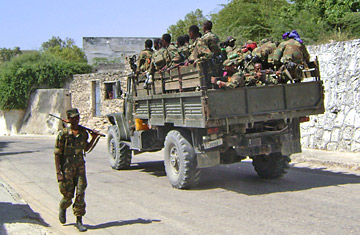
Ethiopian soldiers on a truck following a farewell ceremony which took place in the presidential palace, Mogadishu, Somalia, Tuesday
The withdrawal of Ethiopian troops from Somalia is a gamble not unlike America's planned drawdown from Iraq.
The Ethiopians, with U.S. assistance, invaded to topple an Islamist movement that controlled Mogadishu, and had been sheltering a handful of al-Qaeda operatives. Osama bin Laden's movement killed more than 200 people when they attacked two U.S. embassies in Kenya and Tanzania in 1998, and several small groups of U.S. special operations soldiers accompanied the Ethiopians in the hope that the invasion would flush local operatives out into the open. The Ethiopians drove out the Islamic Courts Union (ICU), but quickly became the target of the Islamist Shabaab insurgency that has raged ever since. Having gone in to provide a solution, the Ethiopian presence quickly became a new problem — and a coalition of clan warlords the Ethiopians were meant to install as a government is in disarray. By ending their occupation, the Ethiopians are hoping to deprive the insurgency of one of the grievances around which it rallies support, but it's uncertain who will wield power in their wake. (See pictures of Ethiopia's harvest of hunger.)
Like the U.S. in Iraq, the Ethiopians won't admit defeat or miscalculation, but are seeking to withdraw as honorably as possible. But what will they leave behind? In Iraq, the U.S. has taken confidence from the emergence of the Sunni Awakening movement, former insurgents who drove al-Qaeda out of their communities (even if their relations with the Shi'ite-led Iraqi government remain tense). A similar movement has begun to emerge in Mogadishu, reflecting the moderate, tolerant Islam that has traditionally prevailed in Somalia. But Somalia hasn't had a government to speak of for 18 years. There are no institutions that can be revived to institutionalize the new pro-law, anti-extremist movement. And the ICU is remembered, during its brief reign, for bringing the first semblance of law and order Somalia had seen in a generation.
And then there's the complication of the Shabaab's links to al-Qaeda, a fact that means occasional U.S. air strikes are likely to continue even after the Ethiopians have gone. That could complicate stabilization and reconstruction efforts, since anti-American hostility makes any Western presence — even aid organizations or journalists — a target for the Shabaab. (See pictures of al-Qaeda.)
Add to that the problem of piracy off Somalia's coast that has lately had the country back in the headlines. Piracy is driven by poverty, and the frustration at seeing the world's fishing fleets plunder your waters, while the global economy, in the form of heavily laden container ships transiting the Suez Canal, quite literally pass you by. Killing pirates, as an international armada now gathering off Somalia aims to do, doesn't address that. It might briefly deter them, but it doesn't address the root cause of the problem.
The primary effect of Ethiopia's pull-out will simply be to stop Ethiopian troops being killed on the streets of Mogadishu. It will take a lot more than that to fix Somalia.
See pictures of piracy in Somalia.